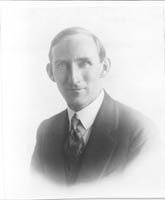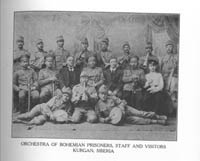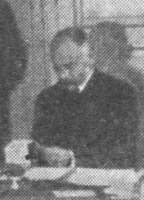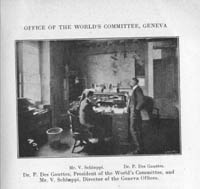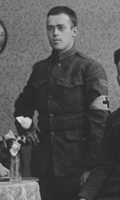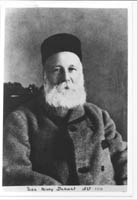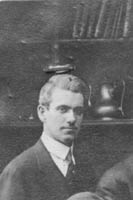Table of Contents
Key Figures
YMCA Secretaries
a | b | c | d | e | f | g | h | j | k | l | m | n-o | p | r | s | t-u | v | w | y-z
J. A. V. Davies
This American Rhodes Scholar, studying at Oxford University, answered the call to conduct War Prisoners Aid services in the Baltic ports program during the Summer of 1920. Operating out of Stettin, Davies assisted Russian prisoners of war leaving Germany and met Central Power POW's arriving from Russian prison camps. Davies sometimes accompanied prisoners and refugees on German steamers which transported people between Stettin and ports in Narva, Estonia, Riga, Latvia, and Bjökö, Finland.
Darius Alton Davis (1883-1970)
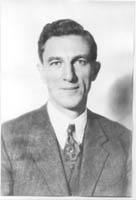
See also:
Chap. 01, p36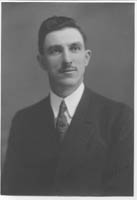
See also:
Chap. 04, p31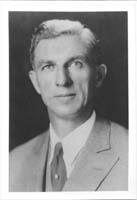
See also:
Chap. 05, p22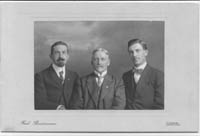
See also:
Chap. 07, p1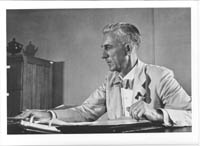
See also:
Chap. 15, p2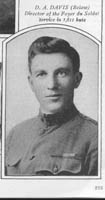
See also:
Chap. 16, p28Davis was an American YMCA Field Secretary in Europe during World War I. He started working for the Association in 1907 in the Division of Religious Work in Washington, DC. In 1910, he traveled to Constantinople to establish an Association movement in the Ottoman Empire. During the Balkan Wars, Davis conducted war morale work for Turkish soldiers. He left Turkey in 1914 and returned to the United States. John R. Mott sent Davis to initiate and develop WPA operations in France, Italy, and Sardinia in 1915. When the United States entered the war, he became the Senior American Secretary in France and supervised the Foyers du Soldat war morale relief work for French soldiers. Davis became the Senior Secretary in Europe in 1919, when Archibald Harte transferred to Jerusalem, and directed the development of national Associations in Russia and Eastern Europe. In 1931, Davis became the Associate General Secretary of the World's Alliance in Geneva. During World War II, Davis worked in New York, serving as the Director of the YMCA's War Prisoners' Aid program. In 1945, he worked with prisoners of war, refugees, and youth in Germany and Austria. Davis retired from the World's Alliance in 1950.
N. D. Davis
An American YMCA secretary, the International Committee in New York assigned N. D. Davis to serve on Archibald C. Harte's staff by November 1916 to support latter's War Prisoners' Aid (WPA) diplomacy in Europe. Davis was responsible for administrative support for various WPA activities (correspondence, inquiries, and reporting) which allowed Harte to focus on maintaining relations with the belligerent governments and the World's Alliance of YMCAs.
George M. Day
Day went to Russia in 1909 to work with the Miyak (Lighthouse), the Russian YMCA, in St. Petersburg to help develop the Association movement in the tsarist empire. In 1913, Day started student work in Kiev, under the leadership of Baron Paul Nicolay. When Russia went to war with Germany in 1914, Day mobilized students to provide relief to Russian soldiers. Day accompanied Archibald C. Harte on his inspection tour of Russian prison camps in 1915, which led to the tsarist government's approval of the establishment of the War Prisoners' Aid (WPA) program for Central Power POW's. Day conducted WPA work at Darnitza and hospital work at Kiev until October 1916. He then transferred to Petrograd to supervise the Book Department. Day received the Russian Order of St. Stanislaus for working with wounded soldiers under fire and for helping to support troop morale. After the outbreak of the Russian Revolution, Day transferred to France in April 1917 and conducted war morale work for Russian soldiers fighting on the Western Front. By 1921, Day had returned to the United States where he worked with Russians at the San Francisco YMCA. He became a Professor of Sociology at Occidental College in Los Angeles.
Paul Des Gouttes
A Swiss Association leader, Des Gouttes served as the President of the World's Committee of the World's Alliance of YMCA's through World War I and was the Honorary General Secretary of the International Red Cross Committee. Des Gouttes was first involved in Association Boys' Work, becoming the President of the Central Commission of French-Speaking Boys' Associations in 1893, an organization that represented work in Belgium, France, and Switzerland. In 1911, Des Gouttes replaced Henri Johannot as the Treasurer of the World's Committee. At the Eighteenth World's Conference in Edinburgh in 1913, the delegates elected Des Gouttes as the new President of the World's Alliance, replacing F. Louis Perrot, who had served as temporary president upon the resignation of Reinhold Sarasin-Warnery. With the outbreak of World War I, Des Gottes led a divided international organization. In August 1914, Des Gouttes declared the neutrality of the World's Alliance, but recognized that Associations in belligerent nations had a patriotic duty to serve their young men who were called to arms. The World's Alliance strongly supported the War Prisoners' Aid (WPA) work begun by the American YMCA. In June 1915, Des Gouttes contacted the Serbian government regarding the Austro-Hungarian demand for the establishment of WPA services for Dual Monarchy prisoners on the basis of the Principle of Reciprocity. The Serbians accepted YMCA service, but the Austro-German-Bulgarian invasion of Serbia in October 1915 made that plan moot. When the United States entered the war in April 1917, Des Gouttes called for secretaries from neutral nations to replace American WPA workers and Mott agreed to fund the effort. In September 1917, in response to the German National YMCA's protest of American WPA Secretaries serving Central Power POW's in Allied countries and Mott's trip to Russia as part of the Root Mission, Des Gouttes raised the issue with the International Committee in New York. When Mott arrived in Geneva in April 1918, Des Gouttes called an emergency meeting of the Executive Council of the World's Committee. Des Gouttes and World's Alliance leaders confronted Mott regarding Archibald Harte's independent approach to POW diplomacy and Mott's unneutral actions. Des Gouttes again called on Mott in August 1918 to reel in Harte to prevent a potential schism between the World's Alliance and the German and Austro-Hungarian governments and WPA work. After the war, Des Gouttes went to great lengths to restore the international leadership of the World's Alliance as the Association attempted to rebuild from the devastation of the war. In April 1919, Des Gouttes called an Executive Committee meeting, which included Mott, Darius A. Davis, Karl Fries, and Harte, to reestablish the neutrality and primacy of the World's Committee. Des Gouttes fervently repudiated the global leadership of the International Committee of North America and the emerging European focus of American and English YMCA work. In 1926, Des Gouttes resigned as President of the World's Committee and was replaced by Mott.
Emmanuel Diehl
A Swedish YMCA secretary, Diehl volunteered to work for prisoners of war in Germany as a World's Alliance WPA Secretary. He arrived in November 1917 and supported operations in southwestern Germany, conducting welfare service in prison camps in Württemberg (XIII Army Corps, Royal Württemberg Army Corps, based in Stuttgart), Baden (XIV Army Corps, headquartered in Carlsruhe), and the XVIII Army Corps (based in Frankfurt-am-Main). Diehl was one of the neutral workers who replaced the American WPA Secretaries who left Germany in February 1917.
McPherson H. Donaldson
An American YMCA secretary, Donaldson offered his services to Allied prisoners of war in Austro-Hungarian prison camps as a War Prisoners Aid Secretary during the First World War. He arrived in Bohemia in July 1916 and set up WPA operations at the prison camps in Eger and Heinrichsgrün. Donaldson established an elementary school for illiterate Russian prisoners and collected a large library of Russian books at Eger. In addition, he organized special schools for Georgian and Tartar prisoners. While Russian was included in the curriculum for these students, the school also taught native languages which were not available in schools in the tsarist empire. Donaldson left Austria in April 1917 when most of the other American WPA Secretaries evacuated the Dual Monarchy.
Erving A. Dresser
An American sergeant from Bristol, Connecticut, Dresser was captured by the Germans and sent to the prison camp at Rastatt in Baden. Dresser became the president of the YMCA Committee for Prisoners' Welfare at Rastatt and worked closely with Conrad Hoffman to develop and expand the War Prisoners' Aid program for America POW's.
Gotthard Dumeruth
This Swiss YMCA secretary worked for the World's Alliance and supported the War Prisoners' Aid conference held in Regensburg, Switzerland in July 1919. The participants included the World's Alliance WPA Secretaries who conducted POW relief work in Bulgaria. The objective of the meeting was to draw up policies for future WPA operations to prepare better for the next war.
Jean Henri Dunant (1828-1910)
A Swiss philanthropist and founder of the International Red Cross, Dunant dedicated his life to the welfare of wounded soldiers. Dunant was one of the founding members of the Geneva Association, serving as the Corresponding Secretary in 1852. He was a key mover in the early expansion of the Association Movement across Europe, traveling across the Continent and promoting the establishment of new YMCA's. Deeply disturbed by the inadequate care of wounded at the Battle of Solferino in Italy in 1859, Dunant focused on the creation of an organization which would aid wounded soldiers. He was instrumental in organizing an international conference in Geneva in 1863, which resulted in the codification of the treatment of the wounded (the Geneva Convention of 1864) and the establishment of the International Red Cross. He received the first Nobel Peace Prize in 1901 for his work and bequeathed his wealth to charity in his will.
Lewis W. Dunn
This American YMCA secretary volunteered to serve Allied prisoners of war in Germany as a War Prisoners Aid Secretary. Dunn arrived in Germany in November 1916, accompanied by his wife and daughter. The Dunns left Germany with the embassy train for Switzerland in February 1917 after the United States severed diplomatic relations with the German Empire. The American YMCA reassigned Dunn to service in Great Britain for the duration of the war.
